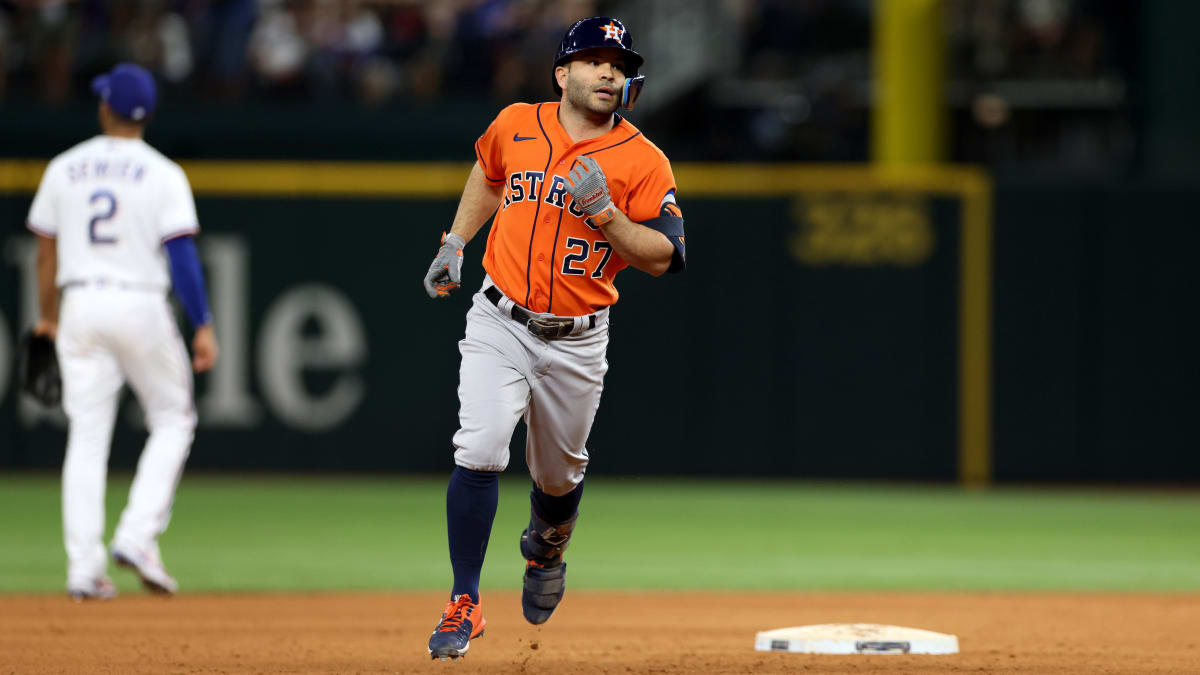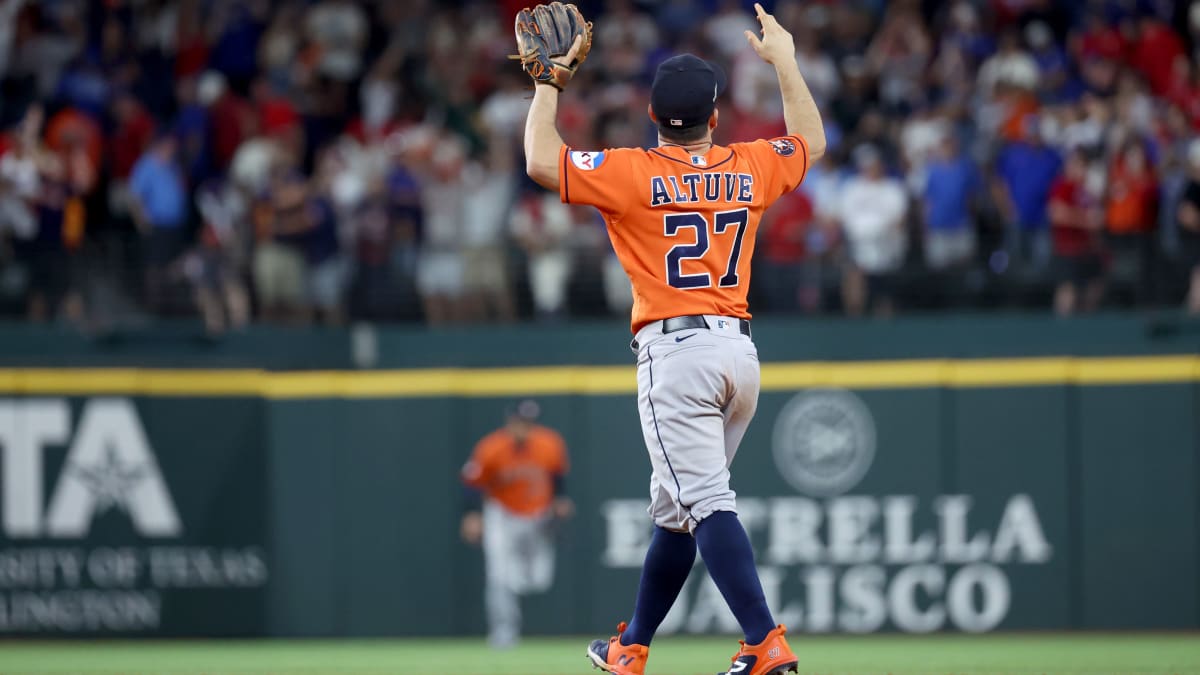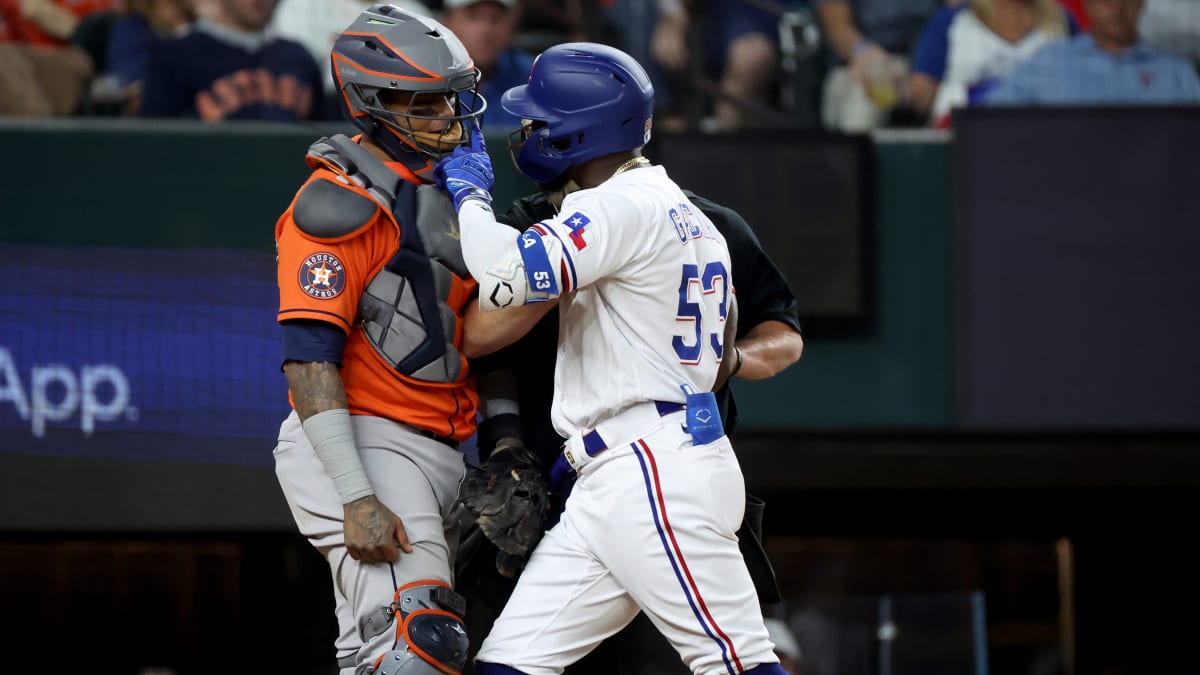The shiny diversions are as plentiful as the Vegas strip at midnight. How umpire James Hoye and Rangers outfielder Adolis García overreacted to a hit by pitch. How Texas closer José Leclerc threw a 3-and-2 changeup to a guy who had not taken a competitive swing in 19 days—and still hasn’t. How Houston catcher Martín Maldonado is always suspect No. 1 when the proverbial flying eraser from the back of the room bounces off the whiteboard.
Don’t be distracted. The Astros are one win away from going back to the World Series because of one of the best pound-for-pound sluggers baseball has ever seen, and who belongs in the line of succession of the most legendary clutch players, from Reggie to Schill to The Captain to Big Papi to Mad Bum and now to José Altuve.

Andrew Dieb/USA TODAY Sports
This was the postseason night baseball owed us. After eight series failed to go the distance and after four somnolent ALCS games with no lead changes and no leads for the home team, October finally and truly arrived on the 20th of the month. The Rangers and Astros gave us three blown leads, three ejections, temper tantrums, controversy and a benches-clearing incident, some of which were interwoven upon one another in this crazy quilt of a ballgame. Like the José Bautista bat flip game in Toronto against Texas in 2015, this one goes into the postseason vault as an unforgettably emotional and wild game.
But don’t get fooled by all the neon. Don’t take your eye off the ball. This game was about Altuve and his growing legend, this time via one jaw-dropping, ninth-inning swing that turned a 4–2 loss into a 5–4 win.
“There is not a moment that is too big for him,” said Astros teammate Mauricio Dubón. “He's a guy that doesn't change. Day in, day out. He’s the face of the franchise. If he’s not a first-ballot Hall of Famer, I don't know what a first ballot is.”
Asked what he has learned from being around Altuve, Dubón said, “Everything. Everything. Whether you have one good at-bat or bad at-bat, just focus. If you’re 0-for-4, it doesn’t matter. You’re still going to have to battle.”
The Rangers were up 4–2 at home with their closer on the mound and stood just three tidy outs from winning ALCS Game 5 and sitting on the doorstep of the World Series. Two runners were on base. Altuve had been 0-for-4, including a blown base-hit bunt attempt to end the fifth inning with two runners on. Truth be told, the bunt was a good idea, what with third baseman Josh Jung a cab ride away and lumbering lefty Jordan Montgomery on the mound. More to the point of Altuve’s baseball acumen, he spent the past two days on his own taking extra bunting practice, working on an otherwise lost if completely disregarded art form.
Think about that for a moment. Altuve is a former MVP who has hit more postseason homers than anybody but Manny Ramírez, has hit more home runs (209) than any player no taller than 5-foot-6 except Hack Wilson, is the first player of that size to reach 2,000 career hits in the past 90 years and reached 2,000 hits, 200 homers and 200 steals faster than anyone in history—and yet he put in extra work before the game working on bunting.
Before the inning began, Altuve, a notorious free swinger, told hitting coach Alex Cintrón, “I just want to go up there and see the ball.”
Cintrón nodded in approval. It was a good sign. He knew it meant Altuve, who was 0-for-2 after two pitches in Game 5, was in a good place.
“Sometimes he goes up there and he goes for fastball, sometimes he goes for off speed,” Cintrón said. “But he said, ‘You know what? I want to go out there and see the ball. Don't get too big and try to hit the ball in the air.’
“And that's what he did. He just wanted to see the ball and try to drive it. Sometimes he just goes up there and tries to get it and that’s when he gets in trouble. But when he goes out there and he's just ready to hit early, that’s why he has 26 postseason home runs.”
Leclerc started him with a slider away. Altuve let it go. Another good sign—patience and calm—even if it nicked the outside corner for a strike. Leclerc and catcher Jonah Heim decided to go with a changeup next. The Rangers have thrown Altuve only 28% fastballs in this series, such is his reputation as a fastball-eating monster. Only Shohei Ohtani and Luis Arráez this year hit heaters better than Altuve (.347).
Leclerc had thrown 723 pitches to righthanded hitters this year, but only 19 of those were changeups, or 2.6%. One of them, left too high and inside, was clobbered by Jose Trevino of the Yankees for a homer back in April. The changeup is his fifth-best pitch against righthanders. But Leclerc had just shown Altuve a slider, and his four-seamer and sinker were off the table because of Altuve’s prowess against velocity. Leclerc went with a 2.6% pitch.
The pitch floated just above the knees, inside—a bit too high and a bit too fat, a mistake pitch to a great hitter. Altuve drove it into the leftfield seats, another No. 1 hit in his Beatles-like collection of chart-toppers, right there with the pennant-winning homer off Aroldis Chapman, the three-homer night against Boston, the three-run, game-tying homer off Clayton Kershaw, the tying, eighth-inning home run at Fenway and all the mad dashes on the bases and sprawling plays he has made on the field over 101 postseason games.
“It's not a big moment for him, you know,” Cintrón said. “He's calm over there. He knows what he needs to do. He knows we need him.”
Said infielder Grae Kessinger, “I’ve learned so much from him. I pick his brain all the time. I asked him one day, ‘How do you stay so calm in the biggest moments?’ He said, ‘I just learned how to focus.’ He did say he didn’t start out that way but it’s a learned skill.”
Before Game 5, when Altuve was asked to pick out the best in his greatest postseason hits collection, he demurred, insisting he was staying in the moment of just enjoying another postseason. Asked again after the game, he had a better answer.
“Yeah, I got to say this one, because it just happened, and still have the emotions, the adrenaline in me,” he said. “Yeah, it was a cool moment, and because we ended up winning.”
This one should sit prominently in the Legend of Altuve discography, but let’s also acknowledge how the Rangers lost this game nearly as much as how Altuve won it. The Rangers bullpen is problematic. When Chapman, for instance, could not get lefthanded-hitting Kyle Tucker to end the eighth, manager Bruce Bochy pushed his closer into the game for a four-out save.

Kevin Jairaj/USA TODAY Sports
This is what Leclerc faced to start the ninth with a two-run lead: Yainer Díaz, who did not have a hit since Sept. 24, and Jonathan Singleton, who did not have a hit since Sept. 13. The numbers eight and nine hitters, both somehow reached against Leclerc to make Altuve’s game-winning homer possible. Díaz singled and Singleton drew a walk when Leclerc made the awful choice to throw a full-count changeup to a guy who never took the bat off his shoulder.
The emotional nonsense of the eighth inning also formed the foundation for the Texas loss. Astros reliever Bryan Abreu began the inning by walking Evan Carter. García stepped in next, his first at-bat after slamming a three-run homer off Justin Verlander in a neck-twisting turn of events in the sixth. In a span of three pitches—double, single, homer—the Rangers turned a 2–1 deficit into a 4–2 lead.
Verlander was sharp in his outing but for two oddly mis-executed fastballs. To both Nathaniel Lowe and García, Verlander threw a four-seam fastball that had arm-side run like a two-seamer rather than his preferred four-seam ride—the result of a slightly misplaced hand position on the ball. By running flat rather than riding up, the fastballs were mistakes that turned into home runs.
García celebrated his home run by carrying his bat halfway up the first base line and slamming it down. He also stomped on home plate as he completed his tour of the bases.
By today’s standards—not the old-school Brian McCann etiquette standards—it was tame stuff that bothers no one. At no point did García direct any emotion toward the Astros.
“No, I don't think anybody is mad about him pimping a homer,” Verlander said. “It was the biggest homer in his career, quite honestly.”
Said Maldonado, “I honestly didn’t look at” García’s celebration.
If you’re thinking the Astros wanted to throw at Garcia because he over-celebrated a homer, you’re wrong. Why, then, would they throw at him and further risk falling behind Texas in the series, three games to two?
Maldonado called for a first-pitch fastball from Abreu to García. The catcher set up outside, but Abreu said he decided to throw it up and in.“That’s where I want to go with Garcia,” Abreu said. “Fastballs up and in, because he wants to spin around the ball and gets his arms extended, and sliders down and away.”
The 97-mph fastball had an arm-side run and hit García around the shoulder. Immediately García spun and shouted angrily at Maldonado.
The catcher said García yelled, “Why like that?” Maldonado replied, “Why what?”
Abreu shouted to García that he wasn’t trying to hit him.
“Bull--!” García said.
“That’s when I knew he was hot and knew I wasn’t going to say anything more,” Abreu said.
García continued to rant and try to get in Maldonado’s face. The Rangers had a run-in with Maldonado in July when the catcher told Texas second baseman Marcus Semien after a homer, “We’re still going to beat you. Just like we did [when you were] in Oakland.” Maldonado is a fierce competitor known for verbal gamesmanship. He gets under the skin of opponents. García and Maldonado are friends—as are off-season workout partners García and Houston DH Yordan Álvarez—but Maldonado’s reputation could easily have added to García’s anger about getting hit. The escalation of his argument caused the benches to empty.

Kevin Jairaj/USA TODAY Sports
Hoye, the crew chief, eventually gathered his umpires together to decide if Abreu hit García on purpose. The consensus was that it was intentional. Abreu was ejected. So were García and a livid Astros manager Dusty Baker. It was a strictly by-the-book ruling that did not take game context in mind.
No team down two runs late in an LCS game—already with a runner on and no outs—is going to put another runner on base because of ... what exactly? It wasn’t the celebration.
Hoye told Baker and Houston third baseman Alex Bregman the umpires ruled it intentional “because their best hitter got hit after hitting a three-run homer,” as if there is some manual or HBP algorithm to blindly follow.
Bregman told Hoye, “C’mon. We play our whole lives to have a chance to go to the World Series and we’re going to give the other team another baserunner when we’re down two? In a League Championship Series? No way.”
Even García’s own manager, if you parse his position, knew intentionally hitting a batter there in a close and pivotal LCS game makes no baseball sense. When asked if he were “fairly certain” Abreu intentionally threw at García, Bochy equivocated.
“Who knows?” Bochy said. “The guy hits a three-run homer; the next time up he gets smoked there. It doesn't really matter. I'd be upset, too, if I was Doli. But like I said, it just took too long to get things back in order. That's what was frustrating me.”
“Who knows?” “It doesn’t really matter?”
That’s not the condemnation of an old-school baseball man who knows intentional beanings when he sees them.
If García simply allows for the initial burst of anger—after all, it hurts—but then marches without protest to first base, the Rangers have a rally going against a shaky Abreu and things proceed in their direction. Instead, the game took a weird but pulsating stoppage, Ryan Pressly eventually replaced Abreu and Leclerc, who had just entered to pick up a shaky Chapman, sat around waiting for the ninth. None of it was necessary and all of it worked against Texas: the arrival of Pressly, the removal of García , the icing of Leclerc and, mostly, the fire lit under Houston.
From my positions next to and inside the Houston dugout, after Pressly somehow pitched out of that eighth inning to keep the game at 4–2, the Astros were never as loud and determined as they were in that moment. Players banged on the back of benches, high-fived, exhorted one another and otherwise found energy that they had lost after García’s homer.
“I don’t want to say it gave us more determination,” Dubón said, “but yes, it fired us up.”
The Rangers have plenty of blame for the loss, and it does not rest with Abreu. You can look at the lack of execution by Chapman and Leclerc, how Texas put two runners on base with no outs in the eighth and ninth innings and scored none of them and how Garcia helped fire up the Astros instead of just taking his base.
But we know where the true blame lies. At least three times this week Bochy has marveled at Altuve and all that power packed inside that small body. “I don’t know how he hits the ball as hard and as far as he does,” he said.
In his regular season career, prolific as it is, Altuve hits a home run every 31.9 at bats. But get him to the plate in a postseason game, and his home run rate almost doubles, to one every 16.1 at bats. That’s nearly as frequent as Reggie Jackson (15.6) and Albert Pujols (16.0) and better than that of David Ortiz (17.9) and Barry Bonds (16.7).
Blame it on Altuve. Blame it on the baseball version of neon, an otherwise colorless, odorless inert monatomic gas that when placed in an electric field suddenly throws off a fantastic red-orange glow. This being the postseason, the light from Altuve is fantastic.







